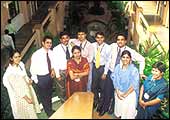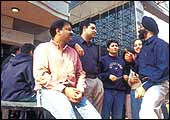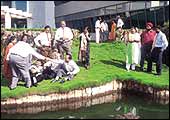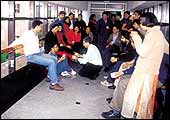 |
| Infosys (Rank 1):
Its DNA resilient enough to cope with
the slowdown, it's business as usual for Infosys. As this @work
snaphot shows, nothing has really changed |
It's hard to believe
Raja Krishnamoorthy when he says there have been no retrenchments
at Polaris. It's harder to believe him when he says most junior
and middle-level executives were recipients of a 20 per cent pay
hike in the middle of the great tech meltdown. Skepticism is but
a natural state of mind when one is speaking to Krishnamoorthy.
The head of HR at the Chennai-based software
company is an in-demand Kollywood (that's the Chennai motion PIC
industry) villain and it does seem inconceivable that a man who
portrays evil so well could actually be doing someone some good.
Krishnamoorthy speaketh the truth: the salaries of junior employees
did go up by 20 per cent, and the increase came at the expense of
senior executives (vice president and above). "This was done
voluntarily," explains the screen-baddie.
 |
| Agilent (Rank 6):
These Agilent employees may look cool
but they've just put up with a 10 per cent reduction in salaries.
Communication has taken the sting off |
 |
| Oracle (Rank 15):
These Oracle staffers at the company's
Bangalore development centre manage to give the pharse work-life
balance a whole new meaning |
 |
| Polaris (Rank 21):
If these Polaris employees look happy
that's because there have been no layoffs at the company and
junior employees received a 20 per cent raise |
If Polaris hiked pay by 20 per cent, then, Bangalore-based
Sasken, a telecommunication software hothouse, did the opposite:
from chairman to char woman, everyone accepted a 20 per cent cut
in pay. "We had a choice," says Rajiv Mody, CEO and Chairman.
"Opt for mass layoffs, or spread the pain and wait out the
nuclear winter." Just two of the company's 1,000-odd employees
left when the cut was announced. S.R. Raja, a technical leader at
Sasken's services group belongs to the majority that chose to stay.
"We shared the good times and are ready to wait out the bad."
It isn't just pay: tech companies across India
were (and are) in deprivation-mode.
At Hughes Software's Gurgaon-office, the once-elaborate
buffet has been replaced by a fixed-menu and the company used no
heating this winter, for savings of a mere Rs 20 lakh. And oh, yes,
Hughes cut 100 jobs. Agilent's employees accepted a 10 per cent
cut in pay (and a further reduction is expected in March).
This isn't another of the by-now predictable
jeremiads on how yesterday's Masters of the Universe were humbled.
It is a story on the best employers in India. And, like it or not,
and as implausible as it may seem, tech companies can still stake
their claim to that appellation.
That's right, some slashed pay, others actually
laid off people, still others did away with valued perquisites,
and the sector remains the most sought after employer in India:
11 of the 25 best employers in India, according to the second BT-Hewitt
survey, are tech companies. There's Infosys at 1 and hp at 3, the
same positions as they occupied last year. There's Satyam at 5,
Agilent at 6, Hughes Software at 11 (4 last year), Sasken at 14,
and Oracle at 15. And finally, there are Compaq at 18, Microsoft
at 19, Polaris at 21, and ST Microelectronics at 24.
Communicating The Crunch
Not every tech company in the list faced the
human resources challenges thrown up by a slowdown. At Microsoft
India, CEO Rajiv Kaul's main concern is not managing in a downturn-there
isn't really one for the company's operation in India-but keeping
his 194-member workforce motivated. "I have to keep their adrenaline
flowing," says Kaul, seemingly oblivious of the employee on
a Razor (scooter) who whizzes past his room even as he speaks.
| Reliance* (Rank 16):
It helps that Reliance has an integrated
township at Jamnagar that takes care of all employee needs,
from telecommunications to entertainment, and from sport to
worship. But that doesn't mean performance takes the back seat.
Managers of Rerliance make a commitment on their performance
to the company's chairman. When they achieve the stated target,
they receive a letter complimenting them and their teams from
the chairman. * Reliance Industries and Reliance Petroleum participated
as one entity |
| American Express Bank
(Rank 8): At AmEx, it is what Sanjay
Gupta, Vice President and General Manager of Financial Centre
East, (a financial services back-office of sorts), calls "blue-box
values'' that drive people policies. Blue-box, for the uninitiated
is how company insiders refer to the parent, and the values
referred to include a 360-degree feedback for employees, cross-functional
training, and the freedom to apply for a job anywhere in the
American Express network of 130 countries. |
| Tata Steel (Rank 12):
Tata Steel's value-set was laid down by
Jamsetji Tata himself: fairness, honesty, and ethical behaviour.
The result is one of the most 'caring' employers in the country
and the way the company reduced its workforce from 73,000 to
48,000 over six years hasn't changed any of that. But as CEO
B. Muthuraman says, all this emphasis on creating a great workplace
means the company will demand higher performance levels from
its employees, measure these objectively, and reward them accordingly. |
And Infosys, which acknowledges the fact that
the sector's prospects don't look anywhere as rosy as they did a
few years back says that hasn't made a difference to its management
style. "Downturn or not, Infosys believes talent finds its
own level," says CEO-designate Nandan M. Nilekani. "If
efforts are not made to attract, retain, and nurture it, talent
will walk out the front door."
It's alright for Nilekani, whose company didn't
have to slash pay or workforce to say this. But how can a company
reduce headcount without setting off a panic among other employees.
One common thread among the companies that
had to do this-Hughes, Sasken, Agilent, and hp either laid off people
or cut pay, or both-is transparency. At Hughes, CEO Arun Kumar himself
went through the history of each of the 100 people the company laid
off to ensure that their selection was fair; all lay-offs were done
on the same day; and Kumar addressed an all-employee meet (with
1,669 employees this had to be done on an open plot of ground near
the Hughes office, public address system and all, very much like
a political rally).
At Agilent-an hp spin-off that considers itself
the true inheritor of William Hewlett and Dave Packard's legacy-Head
of Human Resources Jayantika Burman adopted a similar approach to
explain the pay cut. "The reality today is such that people
happily say yes (to pay cuts)." Or, as Madhu Nair, a sales
manager with the company, puts it, "Pay cuts pinch, but better
that than more people having to lose jobs." And at hp, employees
were given the option of taking eight days of accumulated leave,
forgoing pay for an equivalent period, or doing half of each. The
best thing about the whole thing, according to Shailaja Reddy, a
25-year-old software engineer at hp, was that, "there was also
the option of not taking up any of these options."
|
|
| Sasken (Rank 14):
There's nothing austere about the Sasken
office, but rather than having to lay off people the company
decided on an across the board pay cut |
|
|
| Hughes (Rank 17):
Open-house sessionjs like this one HR
head Aadesh Goyal (on chair) is hosting made everyone at Hughes
a willing participant in the cost-and head-count reduction exercise |
|
|
| Compaq (Rank 18):
The merge with HP raises the spectre
of job redundancy and layoffs. So, CEO Balu Doraiswamy (at the
lectern) set up a war-room to address concerns |
 |
| Microsoft (Rank 19):
For CEo Rajiv Kaul (second from left)
and HR Head Debashis Patnaik (corner left) the big challenge
is to keep their employees charged all the time |
Compaq had to let some people go too-a result
of merging its commercial and SoHo personal computer divisions,
and it won't say how much-but it tried to redeploy the excess workforce
and outplace those whom it couldn't. 34-year-old N. Rajashekar was
one such-he now works for a Compaq-vendor. "The human resources
department not only helped me draft my resume but also trained me
for the interview."
And even those companies that had to, perforce,
give out lower raises in 2001 (as compared to previous years) attempted
to soften the blow. At Satyam Computer Services this took the form
of creating a corpus out of the total increase in the payroll, establishing
an objective performance criteria, and endowing the heads of business
units with the freedom to distribute this among their employees
as they deemed fit.
If the response of tech companies to the challenges
posed by the slowdown didn't give their employees reason to complain,
then the sector's traditional feel-good people policies ensured
that it would remain a preferred employer. These range from making
work fun to an emphasis on training and career development to institutionalised
employee feedback mechanisms. Then, there's the small matter regarding
growth: the better tech companies expect to grow by between 25 per
cent and 35 per cent this year, and while that is far lower than
last year's astronomical growth rates, it is nothing to be scoffed
at.
There is also the issue of individual growth:
Ayyappa Nagubandi joined Satyam as an assistant on the travel desk.
Today, he is a web designer, a billable employee. Not too many sectors
can promise growth of that magnitude, leave alone the shift from
staff to line.
Finally, tech companies have always been better
than other companies at communicating with their employees. Soon
after the Hewlett Packard Compaq merger was announced, Compaq India
set up a war-room to address the unstated fear of redundancy (a
possible 50 per cent) that swept through the organisation. "Irrespective
of the outcome of the merger, we wanted to assuage employee-fears,"
explains chief executive officer Balu Doraiswamy.
Analysts can find niggling faults with the
business models of some tech companies, but their people policies
have proved resilient enough to last the first year of the great
drought. Will they last the second, if the current downturn continues?
That's a question only the third BT-Hewitt survey can answer.
-reported by Seema Shukla,
Ashutosh Sinha, Nitya Varadarajan, Venkatesha Babu, and E. Kumar
Sharma
1 2
| LG
(Rank 23): In a peculiar twist,
Korean consumer electronics major LG sends people to the homes
of employees to educate family members on what their loved ones
do at work and how important they are to the organisation. Apart
from expanding the scope of its engagement from just the employee
to the employee and his or her family, this helps address issues
related to work-life balance. |
Tata
Engineering (Rank 25): That renowned Tata touch on people-related
issues helps. Ever heard of a company with a leave bank that
operates like any other bank? Tata Engineering has one where
employees can credit and debit their leave. Still better, this
is one company that treats its human resources department not
as a cost centre like most companies do but as a revenue centre. |
 |
 |
 |
| HP (Rank
3): CEO Arun Thiagarajan (standing:
second from right in the far left group), President Vivek Nagarkatt
(standing: for right near the building), and HR Head C. Mahalingam
(far left) at an informal gathering |
ST Microelectronics
(Rank 14): It may operate in a
recessionary industry, but with HR Head Praneet Mehrish (sitting:
centre) ruling out layoffs, its employees can afford to relax |
Satyam (Rank
5): At Satyam Computer Services,
someone who joins as an assistant on the help-desk has the opportunity
to grow intoa billable employee. Speaks volumes of the company's
emphasis on career development |
|

